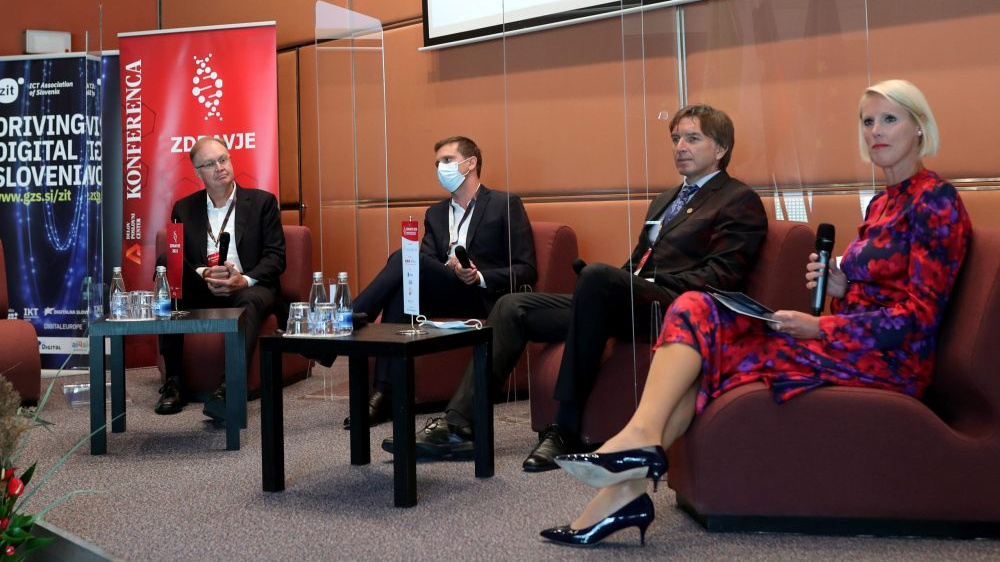10 Years of Digital Development Concentrated in a Single Year
The Adriatic Staff
Cover photo: Delo (Blaž Samec)
The Slovenian healthcare system needs a catchy story. A story that will tell how the system works and how to improve it. But it also needs critical monitoring.
Slovenia needs the digitalisation of procedures in healthcare and a shift from the current system, which is not financially sustainable, towards a system that pays for health services according to the success of treatment. This is so-called value-based healthcare. At the business conference Health 2021, organized by the media house Delo in Ljubljana, this was agreed by speakers from the medicine, pharmacy, entrepreneurship and technological organizations that enable data collection and analysis, support solutions for the health system.
Tine Kračun, director of the Institute for Strategic Solutions, which was the content partner of the event, pointed out: »There are three key findings of today’s conference. The Slovenian healthcare system needs a marketing story, but at the same time, a critical monitoring and evaluation. Telemedicine has made some progress. However, there are still many opportunities for process optimization, Kračun pointed out. Still, the health care system relies too much on the systemic solutions by large companies, but suffers from acknowledging solutions of startups, which are the driving force of development. We need better awareness that development can come from below, not necessarily from above,« concluded Kračun.
According to Tomaž Gornik, founder and director of Better, the corona crisis has given digitalisation an acceleration that has cramped 10 years of development to a single year.
Doctor Aleš Rozman, director of the Golnik Clinic, argued that the key challenge for Slovenian healthcare, besides digitalisation, remains the provision of staff and reduction ofwaiting times. How would Rozman improve the efficiency of work in hospitals? »I would hire a work organizer, a departmental coordinator, to take care of well-running processes and try to find mistakes so we can fix them.«
An important realization when implementing digital solutions in the UK is that you need to have a good plan, but you also need to be willing to adapt and fix it if it proves necessary, said John Gwilliam, head of digitalization and delivery implementation at Wye Valley NHS Trust Hospital.

The keynote speaker at the event, Marco Marsella, Head of H3-E-Health, Wellbeing, Aging at the European Commission’s Directorate-General, pointed out that as many as 90% of patients would like access to their health data and are willing to share it, but only if the data is adequately secured.
»There is a natural flow of changes in healthcare that cannot be stopped. The system will have to change. We are at a turning point. We need a story and something to be proud of. We need organizational and cultural change, the latter in particular. We have a parallel healthcare system, private. That is a fact. However, we must make sure that our public system does not fail.« This is the opinion of Gregor Cuzak, co-creator and co-organizer of the HealthDay.si/ECHAlliance platform.
Digitization for pharmacy means the transition from permanent drug treatment through cell and gene therapy to a single procedure that often eliminates the disease, said Robert Ljoljo, President of the Management Board of Lek and President of Novartis in Slovenia.
Dr. Tadej Battelino, a professor at the Medical Faculty in Ljubljana and a doctor at the Pediatric Clinic, uses video and teleambulatory solutions for children with diabetes. Dr. Battelino presented an example of monitoring values in diabetics and remote counseling. “In some cases, artificial intelligence is just as good as we are,” he said.
Janez Kranjc, President of the Management Board of Prva osebna zavarovalnica (insurer), believes that the direction of the healthcare system is defined by the words quality and timeliness.
»We all want affordable, high-quality, efficient and financially sustainable healthcare that will be digitally supported. The healthcare system has patients, clients. If we want the healthcare system to be as tailored as possible to our customers, then we need to monitor and respond to the needs of the system. The patient must be at the center, and money must follow. Procedures are not the ones that hinder development, the bureaucratic reality is the one that does not follow,« said Petra Juvančič, executive director of the Manager Association, and an expert on healthcare systems.









